in the Narodno Sabranie Square in
Sofia I bought from a street stall the SELECTED WORKS
(PROGRESS PUBLISHERS) in two volumes (poetry and prose
works) of the great Russian writer ALEXANDER PUSHKIN.
It was cold and the talk on the streets was of the
coming snow. "Tomorrow,"
the people said, "it will
snow tomorrow."
It did and I didn't care. I had in my hands two books
containing some of the greatest prose writing of any
century by any writer. Pushkin's art was his
combination of magic realism with social reality in
the early decades of the 19th century. He was
dedicated to preserving what he called the Russians'
"vivid manner of expression and their sly wit." Read
Pushkin – his poetry, prose, journalism and essays –
and you will see how people lived and worked in 19th
century Russia, not how the revisionists would later
portray it.
Pushkin died in 1837, eight years after the great
English poet WILLIAM BLAKE went to his grave, leaving
behind, like the Russian, some of the greatest social
poetry ever written. It was Blake, who questioned the
role of the people who seek to rule, in much of his
work – particularly in his unfinished drama on
Edward
the Fourth.
Blake and Pushkin are relevant today as the Christian
World wages war on the Muslim World on the pretext of
destroying terrorism and our ministers and senators
apply the spin to the social reality. Revisionism has
now become a disease in modern literature, journalism
and writing. In Ireland it has become an art form.
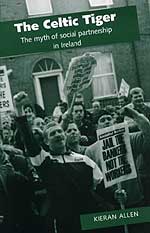 So it is a rare treat to find A WORLD OF FINE
DIFFERENCE by ADRIAN PEACE (UCD)
[full review] – a book that
actually manages to cut through all the revisionist
mythology to tell the true story of a coastal farming
and fishing community struggling to survive in a
modern Ireland that sees no place for small peripheral
villages clinging to mutual aid, co-operation and the
weird notion of community solidarity.
So it is a rare treat to find A WORLD OF FINE
DIFFERENCE by ADRIAN PEACE (UCD)
[full review] – a book that
actually manages to cut through all the revisionist
mythology to tell the true story of a coastal farming
and fishing community struggling to survive in a
modern Ireland that sees no place for small peripheral
villages clinging to mutual aid, co-operation and the
weird notion of community solidarity.
Sadly Peace's excellent study has been ignored.
Instead much has been made of THE MAKING OF THE CELTIC
TIGER by RAY MACSHARRY AND PADRAIC WHITE (MERCIER
PRESS). It is hard to know whether it is fiction,
revisionism or social history. KIERAN ALLEN'S THE CELTIC
TIGER (MANCHESTER) is the book you need to read
if you want to know the social reality behind
Ireland's economic boom. Well researched and
thoughtfully written, Allen tells it as it is.
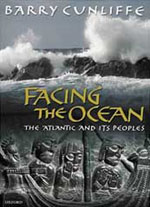 Mac Sharry, a former deputy prime minister, and White,
a former CEO of the Industrial Development Authority
of Ireland, would do themselves a power of good, for
their future careers, if they took a look at BARRY
CUNLIFFE'S FACING THE OCEAN; THE ATLANTIC AND ITS
PEOPLES (OXFORD).
Mac Sharry, a former deputy prime minister, and White,
a former CEO of the Industrial Development Authority
of Ireland, would do themselves a power of good, for
their future careers, if they took a look at BARRY
CUNLIFFE'S FACING THE OCEAN; THE ATLANTIC AND ITS
PEOPLES (OXFORD).
The story of the peoples – Celts,
Bretons and Galicians – who migrated to the Atlantic
fringe, this is real history going back 8,000 years,
told through the eyes of an archaeologist who has read
the bones and studied the artefacts. This is our story
and it makes interesting reading especially to those
in power, particularly in Brussels and Strasbourg, who
believe we cannot be self-sufficient on the Atlantic
fringe. And to put Cunliffe's mighty tome into
perspective take a look at JOHN HAYWOOD'S THE
HISTORICAL ATLAS OF THE CELTIC WORLD (THAMES AND
HUDSON). Where did we come from and how did we get
here? This beautifully crafted book will show you,
especially if you are an fascist with delusions of racial superiority!
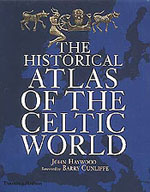 Cunliffe argues that the people who went to the edges
of the world knew what they were doing. They were
seeking a better diet. The coastal areas, rivers and
swamp lands promised a more nutritious bounty than the
forests and mountains of central Europe and Asia, as
the men hunted every manner of beast and fowl and the
women gathered herbs, berries, leaves and seeds.
Cunliffe argues that the people who went to the edges
of the world knew what they were doing. They were
seeking a better diet. The coastal areas, rivers and
swamp lands promised a more nutritious bounty than the
forests and mountains of central Europe and Asia, as
the men hunted every manner of beast and fowl and the
women gathered herbs, berries, leaves and seeds.
ELIZABETH SOMER'S THE ORIGIN DIET (HOLT) describes why
the Celtic tribes were lean and mean, capable of
travelling long distances despite the dangerous
terrain and lived longer than we are often led to
believe. Somer argues that a Stone Age diet will
reduce the risk of heart disease, diabetes,
hypertension, cancer, osteoporosis, reverse bone decay
and loss, increase energy and keep depression at bay.
This is knowledge we have lost because of our
ignorance and prejudice, and our modern, civilised,
superstition towards the wise ones, the Shamans
essential to the survival of every tribe.
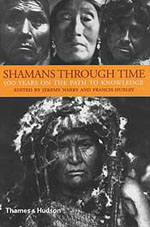 In SHAMANS THROUGH TIME (THAMES AND HUDSON) editors NARBY and
HUXLEY present a rich collection of writings by
anthropologists and others. Shamanism has always been
seen as a different world view – out of step with the
civilised world – until recently when the
pharmaceutical corporates began to realise that
shamanic healing is based on a rich knowledge of
plants.
In SHAMANS THROUGH TIME (THAMES AND HUDSON) editors NARBY and
HUXLEY present a rich collection of writings by
anthropologists and others. Shamanism has always been
seen as a different world view – out of step with the
civilised world – until recently when the
pharmaceutical corporates began to realise that
shamanic healing is based on a rich knowledge of
plants.
The Shamanic world has always seen the Earth as one,
with everything dependent on everything else. This is
a view shared by environmentalists and ecologists, but
it was a scientist, JAMES LOVELOCK, who proposed a
scientific theory that the scientific world could
accept.
He called it Gaia and in HOMAGE TO GAIA
(OXFORD), a kind of autobiography, he explains how it
all came to pass.
Now all this knowledge is making us realise we must
come up with new political paradigms to protect the
Earth and devise social solutions to the problems we
have caused with our destructive behaviour. CHELLIS
GLENDINNING once wrote a book called My Name is
Chellis and I'm in Recovery from Western Civilisation,
in which she argued that
"in western culture, we live
with chronic anxiety, anger, and a sense that
something essential is missing from our lives, that we
exist without a soul."
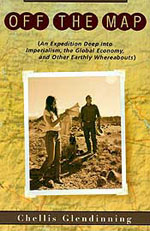 An eco-psychiatrist, she has
followed this with OFF THE MAP (SHAMBHALA), another
personal report on the world we live in, this time on
the impact imperialism and globalisation are having on
our lives, and why we must challenge it.
An eco-psychiatrist, she has
followed this with OFF THE MAP (SHAMBHALA), another
personal report on the world we live in, this time on
the impact imperialism and globalisation are having on
our lives, and why we must challenge it.
To the ignorant that challenge is primarily an angry
one on the streets of Brussels, Seattle, Genoa and
other places. Those who think that should seek out a
copy of DO OR DIE. Now in its ninth edition this
Brighton, England based annual book is arguably the
best voice from a movement that now has many names.
The Do or Die Collective keep it simple. It is about
ecological resistance. In the same vein is DAYS OF
WAR, NIGHTS OF LOVE from the CrimethInc Workers
Collective in Atlanta, USA. And if you want to know
what really happened in Genoa get ON FIRE, which
contains sixteen essays explaining why it happened and
why it will continue to happen.
Read Pushkin too. He also knew.
 Do or Die is available from:
Prior House
Do or Die is available from:
Prior House
6 Tilbury Place
Brighton
BN2 2GY
Email Do or Die
£6 an edition.
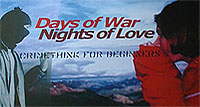 Days is available from:
Days is available from:
CrimethInc HQ
2695 Rangewood Dr
Atlanta GA 30345
for $8.
 On Fire is available from:
On Fire is available from:
Active Distribution
BM Active
London WC1N 3XX
or
AK Distribution
PO Box 12766
Edinburgh EH8 9YE
Email AK
for £4.

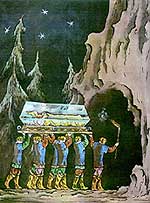
 So it is a rare treat to find A WORLD OF FINE
DIFFERENCE by ADRIAN PEACE (UCD)
So it is a rare treat to find A WORLD OF FINE
DIFFERENCE by ADRIAN PEACE (UCD)  Mac Sharry, a former deputy prime minister, and White,
a former CEO of the Industrial Development Authority
of Ireland, would do themselves a power of good, for
their future careers, if they took a look at BARRY
CUNLIFFE'S FACING THE OCEAN; THE ATLANTIC AND ITS
PEOPLES (OXFORD).
Mac Sharry, a former deputy prime minister, and White,
a former CEO of the Industrial Development Authority
of Ireland, would do themselves a power of good, for
their future careers, if they took a look at BARRY
CUNLIFFE'S FACING THE OCEAN; THE ATLANTIC AND ITS
PEOPLES (OXFORD).
 Cunliffe argues that the people who went to the edges
of the world knew what they were doing. They were
seeking a better diet. The coastal areas, rivers and
swamp lands promised a more nutritious bounty than the
forests and mountains of central Europe and Asia, as
the men hunted every manner of beast and fowl and the
women gathered herbs, berries, leaves and seeds.
Cunliffe argues that the people who went to the edges
of the world knew what they were doing. They were
seeking a better diet. The coastal areas, rivers and
swamp lands promised a more nutritious bounty than the
forests and mountains of central Europe and Asia, as
the men hunted every manner of beast and fowl and the
women gathered herbs, berries, leaves and seeds.
 In SHAMANS THROUGH TIME (THAMES AND HUDSON) editors NARBY and
HUXLEY present a rich collection of writings by
anthropologists and others. Shamanism has always been
seen as a different world view – out of step with the
civilised world – until recently when the
pharmaceutical corporates began to realise that
shamanic healing is based on a rich knowledge of
plants.
In SHAMANS THROUGH TIME (THAMES AND HUDSON) editors NARBY and
HUXLEY present a rich collection of writings by
anthropologists and others. Shamanism has always been
seen as a different world view – out of step with the
civilised world – until recently when the
pharmaceutical corporates began to realise that
shamanic healing is based on a rich knowledge of
plants.
 An eco-psychiatrist, she has
followed this with OFF THE MAP (SHAMBHALA), another
personal report on the world we live in, this time on
the impact imperialism and globalisation are having on
our lives, and why we must challenge it.
An eco-psychiatrist, she has
followed this with OFF THE MAP (SHAMBHALA), another
personal report on the world we live in, this time on
the impact imperialism and globalisation are having on
our lives, and why we must challenge it.
 Do or Die is available from:
Prior House
Do or Die is available from:
Prior House Days is available from:
Days is available from: On Fire is available from:
On Fire is available from: